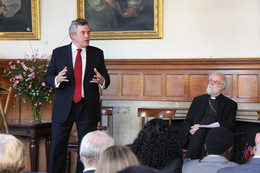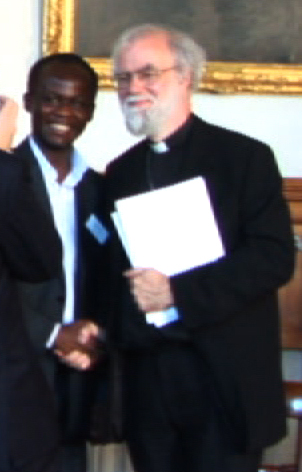Archbishop - “We must locate education at the very heart of the humanitarian agenda”

Monday 3rd September 2012
The Archbishop of Canterbury hosted a conference on Monday 3rd September on Education for Children Affected by Armed Conflict. This issue, and the strengthening of education services provided by Anglican Churches in conflict-affected areas, has been a priority for Dr Williams throughout his ministry as Archbishop.The Conference called for all sections of society to be galvanised to ensure quality education for all children by 2015. Of the 61 million children currently not accessing education, 40% live in fragile and conflict-affected states. For these children, it is not just the challenge of being able to access decent education - in many situations of conflict they also face the trauma of attacks on their schools.
The urgent need was highlighted for increased funding and action on education and child protection in communities affected by conflict The Conference identified priorities for the protection, prevention, monitoring and recovery from attacks on education. The discussion also reflected on the role of faith communities in education and child protection in situations of conflict – and how these needed to be integrated into the wider humanitarian response.
In such contexts, faith groups are often at the front line in continuing to deliver education services, even in the midst of conflict. Because such faith groups remain present in communities before, during and after periods of armed conflict, they remain committed to providing education. Many faith leaders already act as advocates for education, within their communities and nationally. In the Democratic Republic of Congo, for example, a reported 72% of primary education is provided by churches and religious organisations.
 Messeh Kamara, Founder of the Sierra Leone Child Rights Centre, gave a personal account of his experience as a child when his school was attacked:
Messeh Kamara, Founder of the Sierra Leone Child Rights Centre, gave a personal account of his experience as a child when his school was attacked:
“Children were most affected by war and education was hit the hardest. I was going to school one morning but the rebels had already occupied the school and I had to run and hide in the bush. It was a lost decade. But I was fortunate - after many years I was able to return to school”.
In a remarkable story of resilience and hope, Messeh is now studying international law, specialising in human rights.
Gordon Brown - recently appointed as UN Special Envoy on Global Education - spoke about the importance of education as being the only way countries in the developing world (and in particular countries affected by conflict) can break the cycle of poverty. Education is what provides a sustainable way of improving the economies in these countries, by giving children opportunities and hope for the future. He urged the need for ‘drastic action’ and more investment in education if there is to be any chance of meeting the Millennium Development Goals in 2015.
Dr Williams reflected on the day’s inputs, saying:
“This is an issue which takes us to the heart of some of the most disturbing and shocking elements in international life because in recent years , perhaps more than ever, we have seen the disruption of children’s education not only as one of the side effects of conflict but quite often as a deliberate tool of terror.”
In his concluding remarks, the Archbishop welcomed “the practical, robust and constructive recommendations” from the Conference, which he believed “could help those who most need the hope, positivity, creativity and sense of agency that education can give.”
The range of recommendations proposed by speakers at the conference included:
- A commitment to ‘learning for all’ beyond 2015, including for children in conflict affected and fragile states and those caught up in emergencies, increasing the proportion of funding from 2% to at least 4% of humanitarian aid.
- Promoting monitoring and reporting mechanisms, at all levels, and strengthening legislation and accountability to prevent attacks on education.
- Engaging with faith communities and schools on peace building and integrating them into wider education and child protection responses in conflict-affected contexts.
Listen here to the Archbishop's opening remarks and concluding remarks from the conference.
Dr Williams was joined at Lambeth Palace by a range of high-level speakers, including Gordon Brown, recently appointed as the UN Special Envoy on Global Education. Other speakers came from the Foreign and Commonwealth Office, Save the Children UK, Islamic Relief UK, World Vision UK, the Global Coalition to Protect Education from Attack, the Education Cluster and the Child Protection Working Group in Geneva, and the Council of Anglican Provinces in Africa. Case studies on education in South Sudan and DRC were also presented. The audience included representatives from the government, including the FCO and the Department for International Development, from NGOs and human rights groups, and from faith communities.
An estimated 28 million children are denied education because of attacks on schools in a many areas affected by conflict. Such attacks are much more severe and prevalent than had been previously thought, according to UNESCO’s report Education Under Attack 2010. These include the targeting of students and teachers, in armed attacks, killings, abductions, forced recruitment, threats and sexual violence. School buildings and institutions are also looted and destroyed, or taken into military use. These armed attacks cost lives, but also leave millions of children without education and hope for the future, whilst also undermining communities efforts to escape poverty.
